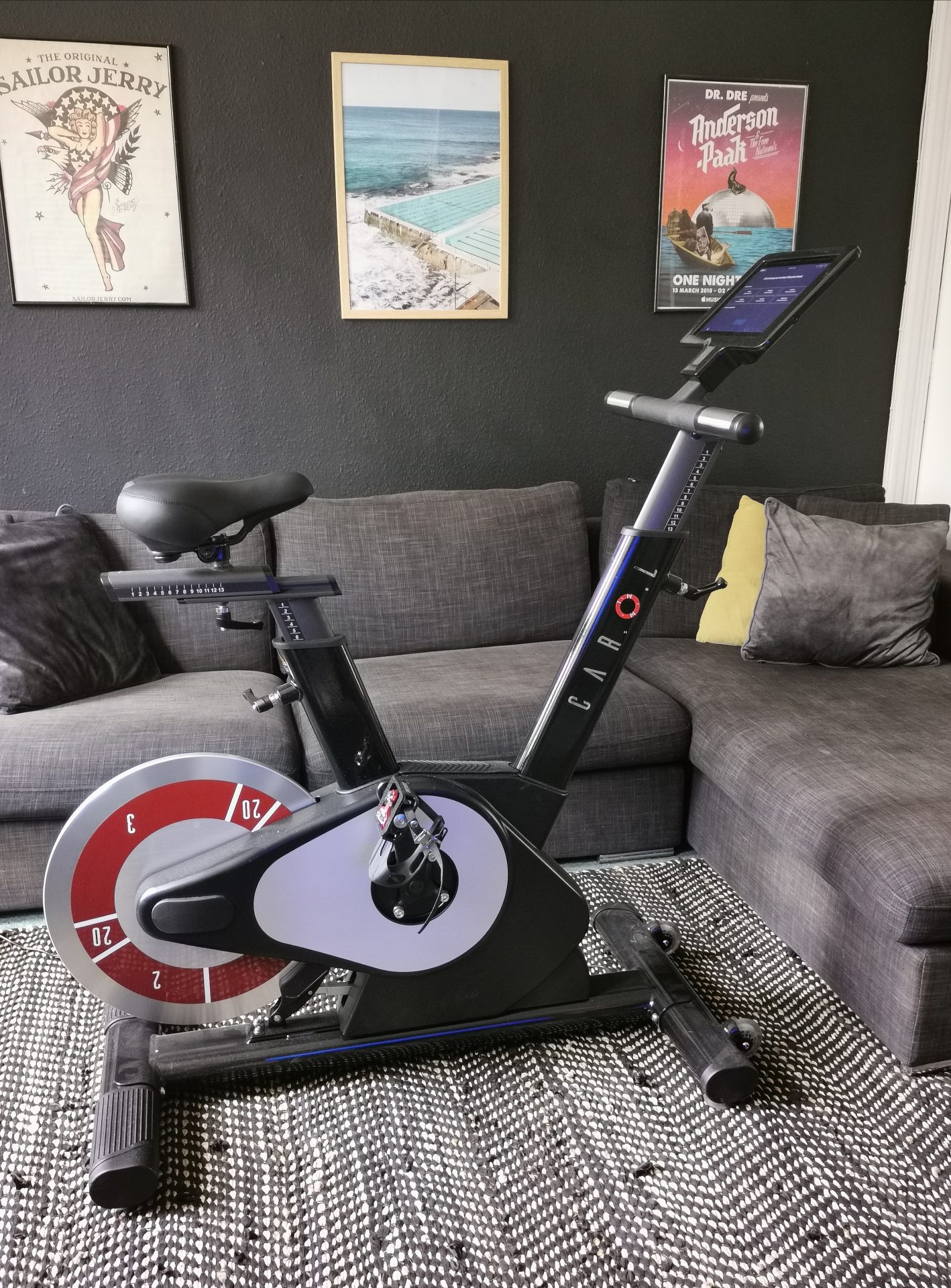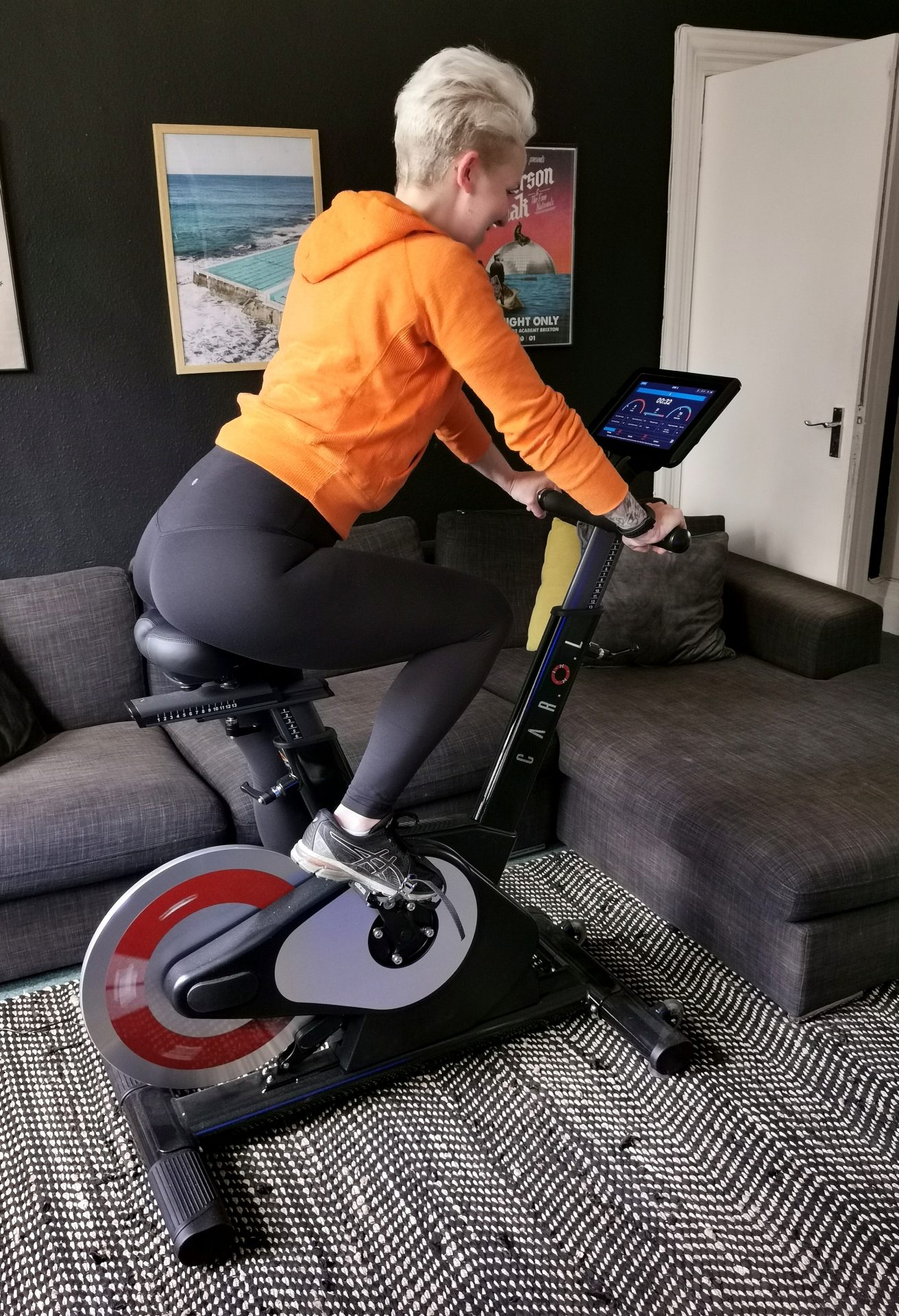CAROL, the AI stationary bike, claims to give you the same cardio benefit of a 45-minute run in just eight minutes and 40 seconds. One writer takes it for a spin and wonders, “Is this the future of fitness?”
Sorry everyone, but spinning is the devil’s exercise class. I consider myself pretty fit, and I love a HIIT workout, but something about indoor cycling makes my body stiffen and my legs scream. I get a real “all pain, no gain” feeling.
Am I doing it wrong? Are my thighs just hollow? Indoor cycling feels like my Everest, so when I was approached to try CAROL – an AI-powered stationary bike that claims to deliver the equivalent benefits of a 45-minute run in under nine minutes – I was intrigued.
I run 5-6k three times a week and, with lockdown restrictions easing, have returned to boxing after a long break. The latter is my lover, the former is my friend. I like running, but I don’t love it. Could I say goodbye to those early-morning runs in favour of shorter, warmer indoor cycling? I hopped in the saddle to find out.
You may also like
Indoor cycling: 9 reasons why indoor cycling can fast-track your training (even now that gyms are open)
THE REHIT
CAROL provides what is known as a REHIT workout – Reduced Exertion High Intensity Training. “It’s a relatively new exercise method,” Alex Parren, personal trainer for Meglio, tells me, “consisting of two to three 20-second maximal effort bursts with three minutes of rest in between. The total session lasts 10 minutes, including a warm up and cool down, and is done on a stationary bike.” A single CAROL session lasts eight minutes and 40-seconds, with two x 20-second sprints of hard work.
“These max effort sprints deplete the glycogen stores within the muscles,” Claire Steels, cyclist and personal trainer for Sundried and director of Steels Fitness adds. “The depletion of glycogen stores causes the adaptations that we look to longer exercise protocols for, such as improved aerobic capacity.”
Studies have also shown that CAROL’s sprints deplete the glycogen stores in your thighs – the body’s biggest stores of sugar – by 25-30%. To get that same result, you’d need to run or do another moderate exercise for 45 minutes or more.
REHIT was first developed by Dr Richard Metcalfe of the University of Swansea, who has spent the past decade “optimising HIIT” in response to the claim that up to 80% of the population don’t have enough time to exercise.
The only problem was that, at the time, REHIT was developed under lab conditions. To achieve the right results, you need to apply the right resistance (personalised to you), at just the right time, and in a fraction of a second. REHIT can’t be recreated on just your average stationary bike. So, how do you reach consumers?
THE RIDE
Enter Ulrich Dempfle, co-founder and CPO of CAROL. “Our team of founders had been working on chronic disease management programs for people with diabetes and found it very challenging to get people to exercise,” he tells me. “When we came across the science of REHIT, we had a light bulb moment and realised this could help people overcome the barrier to exercise.”
Ulrich and his team consulted with the scientists behind REHIT to develop an AI-powered bike. “Our AI algorithms determine the optimal resistance for you, and keep adapting it as you get fitter. Our computer-controlled brake system then applies the resistance fully automatically at the right speed and at the right time.”
Five manufacturers, 40 prototypes and 250,000 rides later, the CAROL bike (priced from £2,195) joined the indoor cycling boom that has only grown since the pandemic.
Cycling enthusiasts like Claire welcome it to the market. “CAROL is great for individuals tight on time,” she says, “but also those who are new to exercise, who don’t have the fitness endurance levels for longer workouts and those who also might find the idea of 30-45 mins of exercise quite daunting.”
I’ll admit that I was sceptical of CAROL’s claims. Until only recently, I’d equated exercise with long, hard work, and just couldn’t conceive of how you could get the equivalent of 45 minutes of cardio in less than nine minutes without putting yourself through the wringer.
Nevertheless, I put in my eight minutes and 40 seconds with CAROL every other day for four weeks to see what would happen. Out of curiosity, I had a whirl on some of the other ride modes too, such as the 20-minute “fat burn” ride. It wasn’t until I started pedalling that I realised 60 10-second sprints lay before me. Welcome to hell.

I could immediately see what CAROL was selling. The two short sprints were hard work, but not enough to make me break a sweat. I was able to chart scores such as my “peak power,” which improved as I adjusted to the bike, and the bike adjusted to me.
If I didn’t do any other forms of exercise, I could see how something like CAROL would be an ideal solution for a busy life – and it would certainly get me over my spinning hurdle. However, studies on CAROL and REHIT had largely been carried out using participants who have sedentary lifestyles.
How could I tell that CAROL was actually doing anything for me, when I’m already pretty active?
I put this question to Ulrich and one of the scientific advisors behind CAROL, Dr Lance Dalleck. “Despite your existing training regimen,” Dr Dalleck said, “CAROL and REHIT definitely have the potential to provide added benefits. In particular, CAROL’s intense rides will target the phosphagen and fast glycolytic energy systems differently when compared to either running or boxing.
“Additionally, you’ll undoubtedly recruit different muscular fibre types during cycling relative to boxing and running. Collectively, these physiological adaptations will translate to greater peak power output.”
You may also like
Indoor cycling: “Why buying a turbo trainer was my best lockdown purchase”
THE FUTURE OF CYCLING & STATIONARY BIKES
While my peak power score did increase, something still felt like it was missing. I wondered what fitness trainers like Alex thought about concepts such as REHIT workouts and the CAROL – where time efficiency is the number one priority of the exercise.
“When it comes to exercise and especially weight loss,” she says, “people often want to find a shortcut to reach their goals. This has been proven time and time again not to be the right way to go about it. Exercise should be an integral part of your lifestyle.
“If you hate indoor cycling and find it boring, switching a 45-minute cycling workout to a 9-minute one won’t address the underlying reason why you’re not exercising enough. This is where other forms of HIIT are better than REHIT, as they allow you to play around with different exercises and equipment. A Tabata workout can be varied and utilises equipment such as kettlebells, weighted balls, and even a barbell – whereas REHIT is restricted to a stationary bike.”
Maybe that’s just it. I understand and appreciate the science of CAROL and REHIT, but I’m not in it for time efficiency. I’m not too fussed about increasing my peak power. Since lockdown, I’ve adopted a more holistic approach to fitness. When one of the only reasons we could leave our houses in 2020 was for exercise, I cherished my daily walks and occasional runs in nearby woods. Working out became as much about mental wellbeing as physical health.
To me, a ride on CAROL feels like the equivalent of a meal replacement shake. Sure, from a health and fitness perspective, the science is solid and it’s mighty convenient – but is that necessarily a good thing?
I put this question to Ulrich.
“If somebody enjoys running, he or she should definitely keep running and enjoy it,” he says.“But, for people who would rather spend time with their kids or partner, meditate or just go to a pub to meet friends, CAROL offers a chance to not have to choose between this and getting a good and effective workout done.” I would argue that you can definitely do both.
“On the other hand,” he adds, “we totally recognise that some users want more variety. We are continually adding more features to the bike to offer more choice and versatility.For example, the bike can be used for streaming classess such as Peloton Digital or Apple Fitness+.”

While CAROL might not be the piece of kit for me, I acknowledge that CAROL isn’t exactly “for” me. Ulrich identifies his key customer groups as “bio-hackers and self-optimisers,” who are looking for “the minimum effective dose of exercise and high-level results quantification”; people with very clear goals such as losing weight or lowering their blood pressure; and athletes who want to dedicate less time to cardio so they can focus more on honing their skills.
Also, as Claire pointed out earlier, CAROL is a good solution for people who are new to exercise or daunted by the idea of longer workouts. Then there are folks with injuries, disabilities and other accessibility issues who may find a nine-minute blast on an at-home bike an ideal way to stay fit and healthy.
Alex also concedes that, despite the restrictions of REHIT, an intelligent bike such as CAROL could well be the answer for people who genuinely don’t have enough hours in the day to juggle work, family, nutrition and exercise.
“Being able to fit a quick nine-minute workout into your day, without having to plan which exercises you’re going to do, will allow otherwise sedentary individuals to at least do some form of exercise,” she says.
“Even so, it would still be better to get outside into the fresh air and sunshine and enjoy the non-physical benefits of an active lifestyle, such as a mental health boost and improved cognitive function.”
Exercise is personal. For me, being able to exercise outside, or with others in real life, feels a bit more special in 2021. I’m glad CAROL exists for those who feel they need it… but you can find me in the park.
Follow @StrongWomenUK on Instagram for the latest workouts, delicious recipes and motivation from your favourite fitness experts.
IMAGE: Ally Sinyard
Source: Read Full Article
